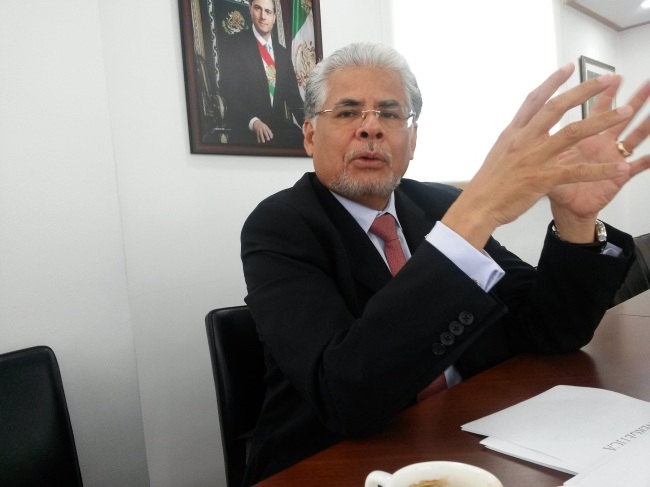For the first time in its 76-year history, the monopoly of Mexico’s state-owned petroleum company, Pemex, was broken as the country signed into law last week reforms that would open the country’s energy sector to foreign competition.
Opening Mexico’s energy sector to foreign competition ― and therefore also massive foreign direct investment ― means South Korean power plant construction companies led by the Korea Electric Power Corporation would likely stand to reap lucrative contracts to the tune of billions of dollars developing Mexico’s neglected power generation network, according to Mexico’s top diplomat in residence here.
“It will mean many new opportunities for Korean companies particularly in the electricity generation sector. They are well known in the oil and gas sector as well, but I think they enjoy a competitive edge in the electricity sector,” said Mexican Ambassador to South Korea Jose Luis Bernal in an interview with The Korea Herald at his office in Seoul on Wednesday.
 |
Mexican Ambassador to South Korea Jose Luis Bernal gestures during an interview with The Korea Herald at his office in Seoul on Wednesday. (Philip Iglauer/The Korea Herald) |
“We believe that with these changes in energy production, delivery and consumption, Korean companies can take advantage of this.”
Mexican President Enrique Pena Nieto signed into law a historic energy reform bill that will allow foreign companies access to oil and gas fields in the country, as well as opportunities to build, operate and distribute electricity.
The reform is meant to make Mexico’s energy industry more competitive, and drive economic growth.
“These reforms brought together two big political parties to initiate these measure, and this means there is a historic turning point for Mexico,” Bernal said. “We have been looking at how the energy sector is working in many countries and we are confident these changes we are making will make a big positive impact.”
Though the country’s left-leaning PRD voiced opposition to the reforms, and some protests by traditional allies of Pemex were seen on the streets of Mexico’s major cities, debate over the reforms was muted.
Even while the country celebrated the 75th anniversary of Pemex last year, plans were underway to change the system.
“There will be many new opportunities in this sector because of the new reforms. Mexico needs $60 billion in annual investment in the oil sector alone, and Pemex can cover only $25 billion in new investment. New shale gas reserves in northern Mexico could be tapped for further development of Mexico’s natural gas sector,” Bernal said, explaining a 100-page executive summary that highlighted major points of the new law.
Mexico hopes the massive $35 billion annual investment gap will be covered by foreign investments spurred by the new reforms. That would translate into an immediate 1 percentage point boost to annual GDP, while a revived Mexican energy sector could boost the economy by 2 percentage points annually from 2018, according to Bernal.
As though in anticipation of the reforms, a KEPCO-led group of Korean companies is already targeting two new contracts that were recently opened to international bidding.
This year, Mexico’s national power company, CFE, will offer $2.8 billion in contracts covering a natural gas and electricity infrastructure project aimed at boosting economic growth.
South Korea is eyeing two combined-cycle power plants near Mexico’s border with the United States.
The scheme is designed to boost natural gas imports from the U.S. and over time help lower electricity rates via cheaper inputs and an ultra-modernized electricity network. Projects are expected to enter into operation by 2017.
According to news reports, such international firms as IEnova, the Mexican subsidiary of U.S. firm Sempra Energy, and France’s GDF Suez will be competing alongside KEPCO for the contracts. The winning bid is scheduled to be announced in December.
One of the power stations, the 928-megawatt Norte III power plant, located about 30 kilometers south of the border city of Juarez, will cost about $1 billion. The other electricity plant, a 714-megawatt combined-cycle Guaymas II power plant in northwestern Sonora state, will cost about $822 million.
The Mexican Embassy has scheduled four seminars over the next several weeks to give Korean executives ample opportunity to learn more about business potential in Mexico.
A seminar on the energy sector reforms will be organized in late September to better inform Korean executives and entrepreneurs on the new changes, but the embassy has not announced the exact date and location.
Those interested will have the opportunity to discuss the changes in three coming seminars.
On Aug. 28, a seminar on international grouping MIKTA will be held at the Korea National Diplomatic Academy. On Sep. 1, a seminar on the auto parts sector will be hosted by Promexico and audit and consulting firm Ernst & Young at the Korean Industries office in Yeouido. On Sep. 2, a joint seminar on the Pacific Alliance will be held at FKI in Yeouido.
By Philip Iglauer (
ephilip2014@heraldcorp.com)








![[Weekender] Korea's traditional sauce culture gains global recognition](http://res.heraldm.com/phpwas/restmb_idxmake.php?idx=644&simg=/content/image/2024/11/21/20241121050153_0.jpg)